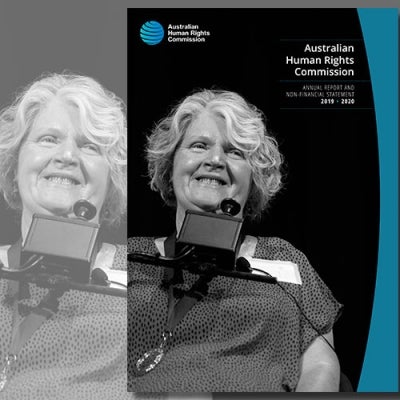Refine results
-
Aboriginal and Torres Strait Islander Social Justice25 August 2022Speech
Sir Wallace Kyle Oration
Jalangurru lanygu balangarri. Yaningi Yatharra ngindaji muwayi indirranggu, Kaurna yani U. It is wonderful to be here with you today on Noongar Boodja country. I would also like to acknowledge all the country from around this state and beyond that people may joining in from online. My deepest respects to all our elders past, present and emerging. I would like to express my thanks to Michelle… -
Rights and Freedoms6 December 2023Publication
Revitalising Australia’s commitment to human rights
This is the final report of the Commission's major, five year Inquiry into Australia's human rights framework. It recommends a National Human Rights Act for Australia and a framework to support it. Download the report, the Executive Summary, and a two-page explainer. -
Commission - General14 October 2020Publication

Annual Report 2019-2020
You can access the Australian Human Rights Commission 2019 – 2020 Annual Report at the Australian Government Transparency Portal. Complaint Statistics 2019-2020 Download PDF | Download Word The year in review The 2019–2020 financial year has been a challenging period. It is impossible to reflect on this period without focusing on the tragic circumstances that have unfolded across Australia… -
Aboriginal and Torres Strait Islander Social Justice25 October 2024Project

Informing The Agenda Consultations
Katie Kiss commenced in the role as the Aboriginal and Torres Strait Islander Social Justice Commissioner on 3 April 2024. To ensure the voices of First Nations people across Australia help form the agenda for the term, the Commissioner is conducting a national listening tour to hear from First Nations people about how we move forward after the Voice Referendum, how to progress and utilise… -
Commission - General22 March 2024Speech
Women’s Club – Foundation Day Club Lunch
Emeritus Professor Rosalind Croucher AM Introduction Thank you Danielle Asciak, for inviting me here today. Let me begin by acknowledging the traditional custodians of the land on which we meet, the Gadigal people of the Eora Nation and pay my respect to Elders, past, present and emerging, and also to acknowledge any Indigenous guests attending today. I am sorry that as a nation we did not… -
Aboriginal and Torres Strait Islander Social Justice8 July 2019Speech
Maranguka Education, Employment and Training Community Summit
Acknowledgements Jalangurru lanygu balangarri. Yaningi warangira ngindaji yuwa muwayi ingirranggu, Ngemba yani U. Yaningi miya ngindaji Muwayi ingga winyira ngarragi thangani. Yathawarra, wilalawarra jalangurru ngarri guda. Good day everyone. I acknowledge the traditional owners, the Ngemba peoples, of the land we meet on today. This is the first time the ears of this land hears my language… -
Rights and Freedoms6 June 2019Speech
Law, Lawyers and Human Rights
Law Week Breakfast Law Society of Western Australia Perth, 13 May 2019 Emeritus Professor Rosalind Croucher AM, President, Australian Human Rights Commission Acknowledgements Thanks to Greg McIntyre SC, President of the Law Society of Western Australia, for the wonderful invitation to speak at the opening of Law Week in Perth. I would like to begin my contribution by acknowledging the… -
Aboriginal and Torres Strait Islander Social Justice10 May 2023Media Release
First Nations women respond to Banksia Hill riots with call for immediate reform to youth justice
First Nations female leaders from across Australia are demanding immediate reform to Western Australia’s approach to youth justice in the wake of today’s riots at the Banksia Hill Juvenile Detention Centre. Hundreds of First Nations women are attending the Wiyi Yani U Thangani National Summit in Canberra this week, including Commissioner for Children and Young People WA Jacqueline McGowan… -
Aboriginal and Torres Strait Islander Social Justice21 February 2013Webpage
International Engagement with Indigenous Rights
Recognising that Indigenous peoples are among the most marginalised and vulnerable peoples in the world, there are a number of international instruments and bodies that advise on Indigenous issues. United Nations Declaration on the Rights of Indigenous Peoples The United Nations Declaration on the Rights of Indigenous Peoples (2007) cover all areas of human rights as they related to… -
Aboriginal and Torres Strait Islander Social Justice27 May 2021Speech
Speech for Reconciliation Week
Aboriginal and Torres Strait Islander Social Justice Commissioner June Oscar AO made this speech at the WA Reconciliation Breakfast on May 29, 2021 Yaningi warangira ngindaji yuwa muwayi ingirranggu, Bunuba yani U. Balangarri wadjirragali jarra ningi gamali ngindaji yau muwayi nyirrami ngarri thangani. Yaningi miya ngindaji Muwayi ingga winyira ngirranggu thangani. Yathawarra, wilalawarra -
Rights and Freedoms8 October 2019Speech
Free and Equal: An Australian Conversation on Human Rights
‘Free and Equal: An Australian Conversation on Human Rights’ 8 October 2019 Opening Remarks Emeritus Professor Rosalind Croucher AM President, Australian Human Rights Commission Check against delivery Your Excellency, Dr Michele Bachelet, United Nations High Commissioner for Human Rights; Australian Human Rights Commission Commissioners—Dr Ben Gauntlett, Disability Discrimination…
Pagination
- First page « First
- Previous page ‹ Previous
- …
- 11
- 12
- 13
- 14
- Current page 15
- 16
- 17
- 18
- 19
- …
- Next page Next ›
- Last page Last »
